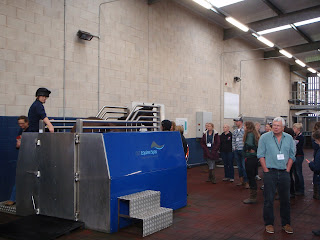A spa break sounds like a heavenly weekend to most riders
but horses can benefit from similar treatment too!
Cold Water Spa therapy is very effective in healing soft
tissue damage in the lower leg, accelerating the healing process and helping to
realign tissue fibres. It is an
effective and key tool in both managing and preventing injury.
Performance horses are regularly expected to manage continuous
concussive forces on lower joints and soft tissues which arise through training
and competing. Using spa treatment as part of a regular regime is advantageous,
reducing the stresses and strains that could have the potential to develop into
more serious injuries. Through using cold therapy immediately after hard exercise,
many of the stressors within the tissues are removed before further
inflammation can develop.
How does it work?
Temperature
The water is chilled at around -4°C, meaning that by the
time the water reaches the horse’s legs it is around 2-4 °C (35 °F). The cool
temperature minimises heat and inflammation while also providing analgesic pain
relief, as well as inhibiting enzyme degeneration of tendons post injury.
The influence of cold on vasoconstriction is well recognised
and this helps with the removal of oedematous fluid as well as eliminating
tissue toxins associated with injury.
Salt Concentration
With salt being present in the water its healing power is
increased. Not only does salt have a natural healing effect on wounds, the
sodium chloride solution also acts as a hypertonic poultice. The high level
hypertonic solution is beneficial in cleaning open wounds, reducing oedema and
also influences the way in which leg tissue temperature falls during treatment.
In addition, water density increases with salt concentration, which in turn
increases pressure to aid fluid and waste dispersal.
Depth
The depth of the water is proportional to the physical
pressure exerted onto the leg which aids fluid and waste dispersal. It can be
varied according to position and severity of the injury. The deeper the
immersion, the greater the pressure, especially at colder temperatures as water
density increases. Furthermore with greater depth, comes a greater volume of
water to surround the leg causing cooling to commence earlier during the downward
passage of blood flow.
Aeration
Water aeration creates turbulence which can work in two
ways. The first is providing a massage effect on the limbs, helping with the
removal of fluids. The second is by increasing the dissolved oxygen content off
the spa solution. The improved oxygen level is believed to improve wound
healing and aerated cold water causes a significant decrease in heart rate
during spa treatment.
Biological Control
With water hygiene levels continually being maintained
through a combination of fine filtration, chlorination, cold water and salt;
the Spa allows thousands of successive treatments. These same factors not only
prevent further micro-biological infections but actually help treat any
pre-existing conditions.
·
Reduces swelling/ inflammation
·
Analgesic effect
·
Encourages better granulation
·
Improves circulation
·
Improves horn growth
·
Injury Prevention
Prevention is always better than cure and here cold salt
water hydrotherapy comes into its own.
Our team regularly
treat many horses and ponies - including a number of top international horses as
part of their management routine. If you
have any further questions or would like your horse to visit the therapy centre
please contact us!
Related Scientific
Literature
Hunt,
E. R. (2001) Response of twenty-seven horses with lower leg injuries to cold
spa bath hydrotherapy. Journal
of Equine Veterinary Science, 21(4),
pp.188-193.


